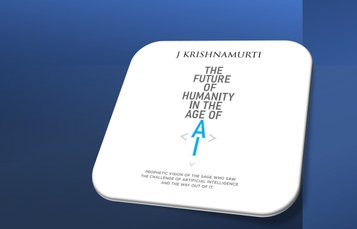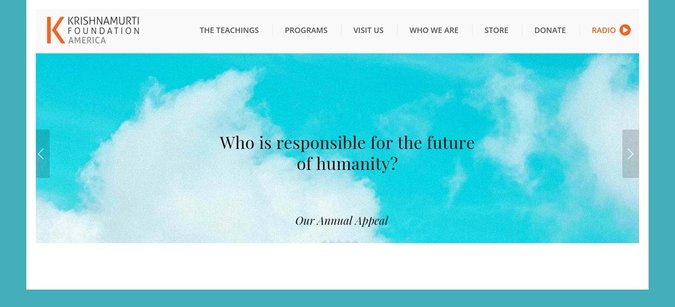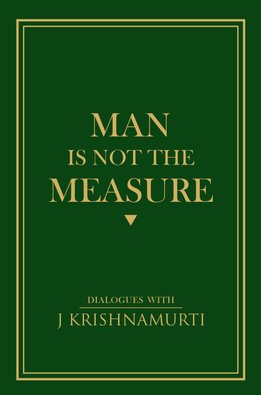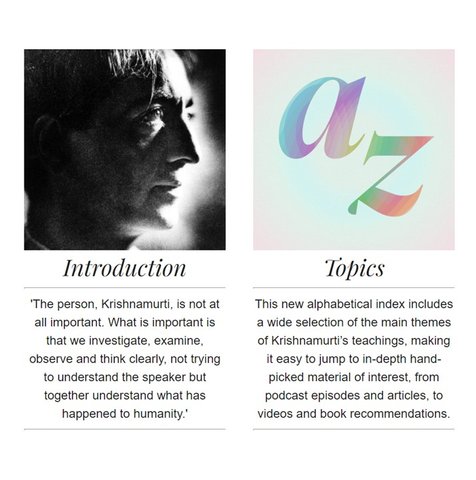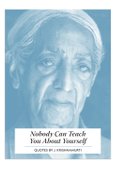Jiddu Krishnamurti talte om livets store spørgsmål, bl.a. kærlighed, konflikt, frihed, samfund og religion. Men først og fremmest om nødvendigheden af en forandring af den menneskelige bevidsthed.
Krishnamurti Komiteen afholder i øjeblikket møder på nettet hver søndag. Har du lyst til at deltage i en Skype - diskussion om Krishnamurti...
"As you are responsible for war, you must be responsible for peace."
From the new book: HOW TO FIND PEACE
Nordic Retreat 2025 vil finde sted fra 8. maj til 12. maj 2025 på Krishnamurti Centre. Bogen "Perfume of the Teaching " vil danne grundlaget for programmet.
Nordic Retreat:The Awakening of Intelligence
At the Krishnamurti Centre, Brockwood ParkEngland
From Thursday2thMayto Monday6thMay 2024
I forbindelse med ovenstående kunne nedenstående måske have interesse.
IS INTELLIGENCE PERSONAL?
Is intelligence personal? Is intelligence the result of book knowledge, logic, experience? Or is intelligence the freedom from the division of thought, the division which thought has created?
Seeing this logically and not being able to go beyond it, it remains with it; it does not try to struggle with it or to overcome it. Out of that comes intelligence.
What is intelligence? Can intelligence be cultivated? Is intelligence innate? Does thought see the truth of conflict and division, or is it the quality of mind that sees the fact and is completely quiet with the fact? Completely silent, not trying to go beyond it, overcome it or change it, but is completely still with the fact. It is that stillness that is intelligence. Intelligence is not thought. Intelligence is this silence and is therefore totally impersonal. It does not belong to any group, to any person, to any race, to any culture.
Krishnamurti, The Awakening of Intelligence
The Core of the Teachings
Written by Krishnamurti in 1980 at the request of Mary Lutyens.
Truth is a pathless land.Man cannot come to it through any organization, through any creed, through any dogma, priest or ritual, not through any philosophical knowledge or psychological technique. He has to find it through the mirror of relationship, through the understanding of the contents of his own mind, through observation and not through intellectual analysis or introspective dissection.
Man has built in himself images as a fence of security—religious, political, personal. These manifest as symbols, ideas, beliefs. The burden of these images dominates man’s thinking, his relationships, and his daily life. These images are the causes of our problems for they divide man from man. His perception of life is shaped by the concepts already established in his mind. The content of his consciousness is his entire existence. The individuality is the name, the form and superficial culture he acquires from tradition and environment. The uniqueness of man does not lie in the superficial but in complete freedom from the content of his consciousness, which is common to all humanity. So he is not an individual.
Freedom is not a reaction; freedom is not choice. It is man’s pretence that because he has choice he is free. Freedom is pure observation without direction, without fear of punishment and reward. Freedom is without motive; freedom is not at the end of the evolution of man but lies in the first step of his existence. In observation one begins to discover the lack of freedom. Freedom is found in the choiceless awareness of our daily existence and activity.
Thought is time. Thought is born of experience and knowledge, which are inseparable from time and the past. Time is the psychological enemy of man. Our action is based on knowledge and therefore time, so man is always a slave to the past. Thought is ever limited and so we live in constant conflict and struggle. There is no psychological evolution. When man becomes aware of the movement of his own thoughts, he will see the division between the thinker and thought, the observer and the observed, the experiencer and the experience. He will discover that this division is an illusion. Then only is there pure observation which is insight without any shadow of the past or of time. This timeless insight brings about a deep, radical mutation in the mind.
Total negation is the essence of the positive. When there is negation of all those things that thought has brought about psychologically, only then is there love, which is compassion and intelligence.
Copyright ©1980 Krishnamurti Foundation Trust Ltd.
Kernen i the Teachings
Skrevet af Krishnamurti i 1980 på opfordring af Mary Lutyens
Sandheden er et land uden stier. Man finder det ikke gennem nogen organisation, nogen tro, noget dogme, nogen præst eller noget ritual, og heller ikke gennem filosofisk viden eller psykologisk metode. Man finder det kun ved at se sig selv i det spejl forholdet til andre udgør, ved at forstå sit eget sinds indhold, ved at iagttage og ikke gennem intellektuel analyse eller minutiøs selvransagelse.
Man har, for at beskytte sig selv, dannet et hav af billeder – religiøse, politiske, personlige. De manifesterer sig som symboler, idéer, meninger. Disse billeder er en byrde og dominerer menneskets tænkning, dets relationer og daglige liv. Disse billeder er årsagen til vores problemer for de skiller menneske fra menneske. Vores opfattelse af livet formes af de begreber, der allerede er etableret i vores sind. Indholdet af menneskets bevidsthed er hele dets tilværelse. Individualiteten er det navn, den form og overfladiske kultur man får fra traditionen og miljøet. Det unikke ved mennesket ligger ikke i det overfladiske men i fuldkommen frihed fra indholdet i dets bevidsthed, som er fælles for hele menneskeheden. Så man er ikke et individ.
Frihed er ikke en reaktion. Frihed er ikke valg. Man foregiver at fordi man har valg, er man fri. Frihed er ren iagttagelse, uden retning, uden frygt for straf eller belønning. Frihed er uden motiv. Frihed findes ikke for enden af menneskets udvikling, men ligger i dets eksistens første skridt. I iagttagelsen begynder man at opdage manglen på frihed. Frihed findes i den ikke-valgte opmærksomhed på vores daglige eksistens og aktivitet.
Tanke er tid. Tanken er et resultat af erfaring og viden, som er uløseligt forbundet med tid og fortid. Tiden er, i sin psykologiske form, menneskets fjende. Vores handlinger er baseret på viden og derfor tid, så mennesket er altid en slave af fortiden. Tanken er generelt begrænset, og derfor lever vi i konstant konflikt og kamp. Der er ingen psykologisk evolution. Når man bliver opmærksom på sin egen bevidstheds bevægelse, vil man se skellet mellem tænkeren og tanken, iagttageren og det iagttagne, den der oplever og oplevelsen. Man vil opdage, at dette skel er en illusion. Først da er der ren iagttagelse, som er indsigt uden en skygge af fortid eller af tid. Denne tidløse indsigt skaber en dyb, radikal mutation i sindet.
Total negation er essensen i det positive. Når der er negation af alle de ting, som tanken har skabt psykologisk, først da er der kærlighed, som er medfølelse og intelligens.
Oversat juni 2022
When the mind is still, tranquil, not seeking any answer or solution, neither resisting nor avoiding, only then can there be a regeneration because then the mind is capable of perceiving what is true. It is truth that liberates, not your effort to be free.’
— From the book THE FIRST AND LAST FREEDOM
Choiceless Awareness
New Video
“There are these three things which we must understand: concentration, choiceless awareness, and attention. Concentration implies resistance – concentration on a particular thing, on the page you are reading, or on the phrase you are trying to understand: to concentrate, to put all your energy in a particular direction. That is one thing. I needn’t enlarge on that, need I? In that concentration there is resistance and therefore there is effort and division. I want to concentrate, thought goes off on something else, I bring it back. The fight. And if you love something you concentrate very easily. All that is implied in the word ‘to concentrate’, to put your mind on a particular object, or a particular picture, a particular action. That is one thing.
Choiceless awareness implies to be aware both objectively, outside, and inwardly, without any choice. Just to be aware of the colours, of the tent, of the trees, the mountains, nature – just to be aware. Not choose, say, ‘I like this’, ‘I don’t like that’ or ‘I want this’, ‘I don’t want that’. Right? To observe without the observer. The observer is the past, which is conditioned, therefore he is always looking from that conditioned point of view, therefore there is like and dislike, my race, your race, my god, your god, all the rest of it. We are saying to be aware implies to observe the whole environment around you, the mountains, the trees, the ugly walls, the towns, aware, look at it. And in that observation there is no decision, no will, no choice. Get it? You understand it?
And attention – concentration, choiceless awareness and attention. In attending there is no center. Right? You are completely attending. Are you now – if I may ask – attending to what is being said? If you are completely, totally attending there is no you who is attending – is there? You understand? If you are listening completely with your heart and with your blood, everything, there is no me attending. Right? There is no me which limits that attention. Then attention is limitless. Right? Therefore attention then has complete space.”
J. Krishnamurti
Talk 7, Saanen (Switzerland), 1977
You raised a question: What is sacred? Without finding that, without coming upon it—not you finding it—without that coming into being, you cannot have a new culture, you cannot have a new human quality.
This remarkable statement dispels the widespread but erroneous notion that Krishnamurti was not a religious teacher but only a rational thinker or a modern intellectual. Over the years, in different contexts and in different words, he kept pointing out that man, with his limited intellect, is always making the mistake of trying to measure life—life which is limitless, immeasurable, incalculable. Can humanity, therefore, turn in a new direction, which is to ‘come upon something which is not man-made, which may be sacred’? This urgent demand of Krishnamurti finds novel expression in this book consisting of fifteen dialogues, held from 1977 to 1984 in Madras, Rishi Valley, Bombay, and New Delhi. The great religious teacher’s concern and compassion cover the whole field of human existence, summed up in profound questions such as: Why is man still what he is after a million years? What am I? What is relevant in life? What price will you pay to end conflict and sorrow? What is the essence of a religious life?
bogen udkom i 2022
Krishnamurti Foundation News
‘Can we live – please listen, my friend – without opinion and prejudice?’
— From the new book CAN CONFLICT END?
Et virtuelt studiecenter
klik på billedet
klik på billedet
Free downloads og Indeks over krishnamurti audioer og videoer på youtube
En dansk hjemmeside med uautoriserede oversættelser, kommentarer, og andet fra det der sker omkring Krishnamurti.
Forholdet, relationen er det vigtigste i livet
J.Krishnamurti
Hvorfor skulle man have en mening om andre? Det er spild af tid og energi
J.Krishnamurti

